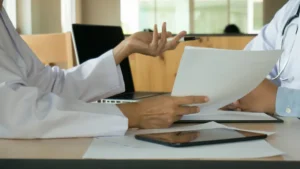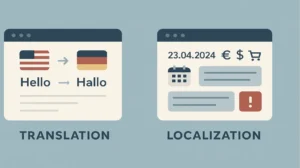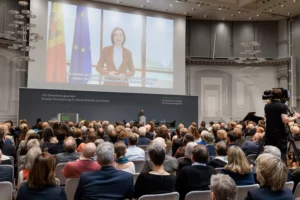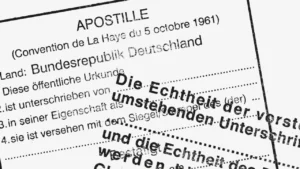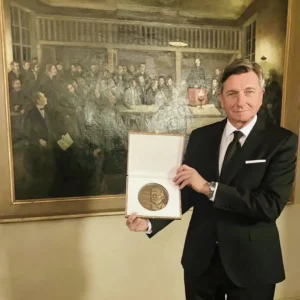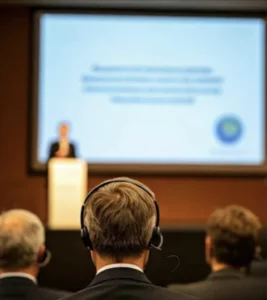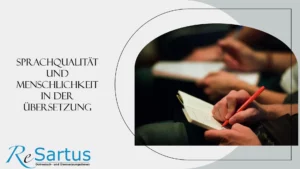
OUR FOCUS
As a professional translation agency, we are the partner you can count on!
Our promise - quality in word and deed
For us, quality means accuracy, reliability, and personal service We support you with all your linguistic challenges, from birth certificates and the recognition of foreign qualifications to notary appointments and international conferences. Whether you are a private customer, a company, or a public authority, we are happy to assist you with advice and support. Contact us today for a consultation!







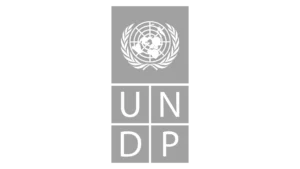











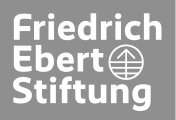




ReSartus -
Your translation
expert
For many years, our customers have trusted ReSartus. We translate into all languages with a passion for multilingual communication. And our success speaks for itself.
You still have questions?
Customer satisfaction is our priority
Our customers include private individuals, companies and public authorities alike.
Our areas of expertise
We support our customers in a wide range of specialist areas.
Certified translations online
Order certified translations of common documents such as birth or marriage certificates quickly and easily in our online store Shop-Translation.


Your questions – Our answers
If you have any further questions, please do not hesitate to contact us!
What is a certified translation?
Certified translations are translations that are done by sworn or authorized translators. They’re usually needed by government agencies like the registry office or the naturalization office.
They differ from normal translations in the following ways:
- Certification note confirming the completeness and accuracy of the translation
- Stamp and signature of the translator
- Fixed connection by means of an eyelet, stapling, or sealing with the source text or a copy thereof
Are my translations from abroad recognized in Germany?
In theory, translations made by a translator sworn-in abroad should be recognized in Germany if they have appropriately overauthentication or legalization.
In practice, however, it turns out that many German authorities do not accept certified translations from abroad. It is often pointed out that certified translations of certificates and documents must be produced by a translator who is sworn or authorized in Germany for the respective language.
Unfortunately, this often means that translations have to be made and paid for twice if they have already been done abroad.
Are my translations made in Germany recognized abroad?
Certified translations issued in Germany for use abroad require preliminary authentication and overauthentication by the Higher Regional Court and often need to be legalized by foreign consulates and embassies before they are valid abroad. Some consulates and embassies only accept their own translators accredited by the respective consulate or embassy.
If you plan to use translations abroad, we advise to contact the receiving agency beforehand and clarify the requirements for recognition of the translation from Germany there.
Some countries accept certified translations from Germany without further ado. Please check with the relevant authority whether they accept translations certified in Germany before you have preliminary or additional certification of your certificates carried out. This can often save you a lot of time and money.
What is an apostille/legalization and how do you obtain one?
Eine Apostille/Legalisation ist eine zusätzliche Echtheitsbestätigung einer ausländischen Urkunde. Dabei bestätigt eine Apostille/Legalisation die Echtheit der Unterschrift und ggf. des Siegels des Unterzeichners sowie dessen Befugnis zur Ausstellung der Urkunde. The Hague Convention Abolishing the Requirement of Legalization for Foreign Public Documents (Apostille Convention) is in force between Germany and many countries. However, Germany has objected to the accession of some countries. You can find a detailed list at the Auswärtiges Amt and in our article on apostilles, legalization, and certifications.
The authorities of the country in which the document was issued are responsible for issuing it, i.e. German authorities for German documents and, for example, Ukrainian authorities for Ukrainian documents.
Further information on apostilles and obtaining documents from abroad can be obtained from the relevant embassies and consulates. We have already prepared this for many languages – select your language from the overview of our working languages! For an apostille relating to German documents, please contact the relevant authority directly. For documents from registry offices, this is usually the respective regional council or district government.
Do you have any further questions? Please feel free to contact us!
By phone on +49 (0) 711 995 222 20
or by email to mail@resartus.de.

- The highest quality standards
- Work according to DIN EN ISO 17100
- Native speaker principle
- Security and data protection
- Customer-oriented project management


What our customers say
Let us know what you have to say about us!
Everything went smoothly. Very fast and professional processing. Very nice contact! I can highly recommend them. Thank you very much!
E. Rai
Customer
I was impressed with how easy it was to order a translation of my documents online and how quickly I received the translation. That’s why they’re my favorite service that I’ve used several times and that I can really recommend!
L. Hailov
Returning customer
It is an office where polite people coordinate perfectly 🙂 Our documents were delivered before the time we were told.
Thank you.
E. Petekkaya
Customer
I am incredibly satisfied. The translation was finished within a day. They are very flexible and always available, even via WhatsApp, which I think is really great! Simply great! Highly recommended!
L. Al-Sibai
Customer
I am very happy to have found this office. Of course there are cheaper offers on the Internet, but I doubt whether everything is 100% satisfactory!
R. Appel
Returning customer
Really great, very fast and professional processing.
Friendly and questions are answered quickly and you really don’t need to compare prices because you won’t find anything better or cheaper.
J. Khalil
Customer
News
Find out what moves us – and what we are putting into motion






